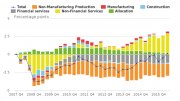Currency fluctuation is the “number one concern” of many senior grocery industry representatives – not Brexit – according to a survey conducted by IGD, the food and grocery research and training charity.
Representing 1,000 corporations and their subsidiaries across the globe, IGD surveyed 400 delegates at a recent event and found that 47 per cent put the falling pound at the top of their list of concerns. Brexit came in second at only 18 per cent.
Foo d pricing was also a “core concern” for most shoppers, IGD’s chief executive, Joanne Denney-Finch (left) told Chief-Exec.com yesterday.
d pricing was also a “core concern” for most shoppers, IGD’s chief executive, Joanne Denney-Finch (left) told Chief-Exec.com yesterday.
“Currency depreciation is the most immediate manifestation of Brexit,” she said.
“… Our research suggests that consumers plan to play it safe in 2017. From this, it is reasonable to believe that price will be a central grocery issue for some time to come, which could lead to pressure on business.”
Some prices have already started to rise – and others have been flagged – as the pound continues to fall. At the time of publishing, £1was worth $1.23 and €1.11. On June 23, the day of the referendum, the pound was worth $1.47 and €1.30.
The Governor of the Bank of England, Mark Carney, has warned that Britain is entering a period of major adjustment.
Groceries, Apple computers, Microsoft business software, petrol, televisions, vacuum cleaners and new cars are among the items already hit by price rises.
A retail partner at KPMG, David McCorquodale, told RetailWeek on Monday that he believes prices will go up between 5-10 per cent.
He said fixed price retailers, such as pound shops, faced a particular dilemma: “They’ll be working with suppliers to adjust the size of products – they’ll be taking a triangle off a bar of Toblerone”.
Since the EU referendum, the average price for a television has risen 11.8 per cent (£88.80) and vacuum cleaners have increased by 11.3 per cent (£23.74), RetailWeek said.
But Mr McCorquodale warned retailers against blaming Brexit for price rises.
“Many of those voters will be your customers,” he said. “You can talk about currency changes but not Brexit – that’s like saying ‘you bloody idiots, what have you done?’”
The Governor of the Bank of England, Mark Carney, has warned that Britain is entering a period of major adjustment.
A consequence of the falling pound is that UK domestic production should become more competitive. However, this positive effect is not the same for all sectors.
A spokesman for the National Farmers Union (NFU) told Chief-Exec.com that it is important to remember that farmers and growers are price takers, not price makers.
“Their opportunity to benefit from sterling’s recent devaluation is likely to be small,” he said.
As most base commodities were priced in US dollars, farmers and growers faced higher prices for imported feed, fuel, fertiliser and machinery.
The UK exported £18 billion worth of food and drink in 2015 to more than 200 countries and territories. The biggest export markets were Ireland, France, the US, Netherlands and Germany.
“British farming is the bedrock of the food and drink industry – a sector worth £108bn and providing jobs for 3.9m million people,” the NFU spokesman said.
 The NFU’s President, Meurig Raymond (right) said: “The most immediate issues confronting the farming sector are trade and access to labour. These must be at the heart of any discussions for the country’s future farm policy so that our industry is able to achieve its true potential”.
The NFU’s President, Meurig Raymond (right) said: “The most immediate issues confronting the farming sector are trade and access to labour. These must be at the heart of any discussions for the country’s future farm policy so that our industry is able to achieve its true potential”.
The NFU’s acting chief economics and international affairs adviser, Andrew Francis said many farmers were already struggling to meet the costs of production within an environment of low prices.
“Should we leave the single market, the implications of trade tariffs could potentially be disastrous for many farm businesses,” Dr Francis said.
“The impact could be felt far and wide across the country, with the public being hit with rising food prices and farmers feeling the effects of production cost increases and customs red-tape.”
By Aban Contractor




